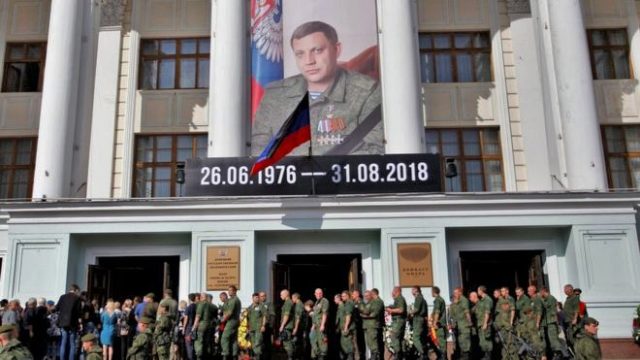
Change at the Top Exposes the Politics of Donetsk-Luhansk ‘People’s Republics’ (Part Two)
Publication: Eurasia Daily Monitor Volume: 15 Issue: 127
By:

*To read Part One, please click here.
The unexplained assassination of the Donetsk “People’s Republic” leader, Aleksandr Zakharchenko, on August 31 (see Part One) provoked a factional commotion in Donetsk. The Kremlin had to intervene openly from September 5 onward to stabilize the political situation. This sequence of events (Donestkoye Agentstvo Novostey, August 31–September 9), exposed the DPR’s endemic lawlessness; although the neighboring Luhansk “People’s Republic” (LPR) admittedly has the worse reputation for violent factionalism.
On August 31, a body self-identified as “DPR Operational Command” and, alternatively, as “Territorial Defense Headquarters,” announced Zakharchenko’s death, along with a decision by this conclave to appoint Dmitry Trapeznikov, hitherto “deputy prime minister,” as interim “president” of DPR. On September 1, a joint meeting of the aforementioned military conclave and the DPR “council of ministers” confirmed Trapeznikov as interim “president.”
Trapeznikov, along with the remaining “deputy prime minister” Aleksandr Timofeyev (both are former paramilitary fighters), were Zakharchenko’s closest associates, with Timofeyev moreover the godfather of Zakharchenko’s children. Still more significantly, Timofeyev (nom de guerre Tashkent), served as “state revenues minister,” in charge of administering the massive industries and mines confiscated by the DPR from Ukrainian owners. As such, Timofeyev commands important financial resources, usable also for political purposes.
The “people’s council” (would-be parliament) chairperson, Denis Pushilin (see Part One), initially complied with the change at the top of the executive “branch.” Pushilin introduced Trapeznikov as interim “president” in the Donetsk press center on August 31, and introduced him again on September 1 to a plenary session of the people’s council, where Trapeznikov made a programmatic statement. On September 2 the “defense minister” and titular “general,” Vladimir Kononov (nom de guerre Tsar), unilaterally announced that Trapeznikov had also been appointed commander-in-chief of DPR forces (without specifying who made that appointment), and pledged that the “defense ministry” would follow Trapeznikov’s orders. However, the internal affairs and state security “ministers” conspicuously refrained from endorsing Trapeznikov.
The prospect of destabilization in Donetsk prompted Moscow’s urgent intervention, staking on Pushilin. On September 5, in Moscow, Aleksei Chesnakov (close associate and public voice of Vladislav Surkov, Kremlin overseer of the DPR-LPR—see Part One) publicized a set of political instructions to Donetsk, almost certainly a summary of the Kremlin’s unpublicized instructions (see Part One). On September 7, the DPR’s “acting prosecutor-general” (a certain Andrei Spivak) issued a “legal” opinion, resembling in its wording a constitutional court’s verdict. This took all cues from Chesnakov’s statement. Thus the Donetsk prosecutor judged the appointment of Trapeznikov as interim “president” to have been “unconstitutional.” The prosecutor asked Pushilin’s people’s council to form a new council of “ministers,” and to appoint a new electoral commission with a view to holding new general elections. Moscow’s TASS news agency replayed the Donetsk prosecutor’s statement on the same day (September 7), for an implicit but clear political endorsement.
Those tasks were duly completed (at least in form) by September 9. The state security and internal affairs “ministries” issued endorsements of Pushilin, and are retained in the new “government.” Kononov, hitherto defense “minister” who had endorsed Trapeznikov, is no longer there; the new “government’s” list does not even mention the “defense ministry” as such (for now). Trapeznikov issued a statement of abdication from the post of interim “president” to make room for Pushilin. Furthermore, Pushilin has also changed the head and the composition of DPR’s electoral commission, in preparation for the scheduled “elections.”
In Moscow, Surkov’s aide Chesnakov slightly lifted a curtain’s corner on the Donetsk events, in two interviews with the official TASS news agency, rerun by its counterpart in Donetsk. He stated that the deceased Zakharchenko, however meritorious as a military figure, “left economic affairs in the hands of individuals whom he trusted, but who misused his trust. In short, they stole. Order must be imposed there. Budget money must benefit people, not go into the pockets of ministers… Worming their way into Zakharchenko’s confidence they were busy embezzling money and grabbing other people’s property,” Chesnakov went on. Specifically regarding the “state revenues minister” Timofeyev (see above), “many people in the DPR have many grievances about him, and such people might rise up in a situation of political instability.” Moreover, Zakharchenko’s initial successor (for just one week—see above) Trapeznikov not only “lacked a ‘legal’ mandate, but would not manage to control the situation for any length of time. Everyone out there saw that. A matter of time before disorders and tremors would begin. And if elections are held, he would not be strong enough to conduct them in orderly ways. His only base of support is Timofeyev” (TASS, September 5, 10).
Chesnakov’s disclosures are politically targeted, and reflect but a fragment of the overall situation in the DPR. Even so, Surkov’s associate and reputed proxy admits to rampant corruption in Donetsk and to a precarious, risk-fraught, deceptive political stability there. He points a finger at the deceased Zakharchenko’s entourage, apparently controlled de facto by Timofeyev and Trapeznikov, both of whom have now been ousted—along with their ally Kononov (see above)—by Pushilin’s measures orchestrated from the Kremlin. And given these disclosures about financial crimes and property grabs, it seems plausible to suppose that the assassination of Zakharchenko may well have been a criminals’ “Razborka” (brutal settling of accounts).



